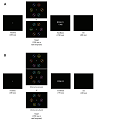Abstract
Previous studies on value-driven attentional capture (VDAC) have demonstrated that the uncertainty of reward value modulates attentional allocation via associative learning. However, it is unclear whether such attentional exploration is executed based on the amount of potential reward information available for refining value prediction or the absolute size of reward prediction error. The present study investigated the effects of reward information (information entropy) and prediction error (variance) on attentional bias while controlling for the influence of the strength of reward association. Participants were instructed to search for either a red or green target circle and respond to the line orientation within the target. Each target color was associated with reward contingencies with different levels of uncertainty. In Experiment 1, one color was paired with a single reward value (zero entropy and variance) and the other with multiple reward values (high entropy and variance). In Experiment 2, one color had a high-entropy, low-variance reward contingency and the other had the inverse. Attentional interference for distractors with high entropy was consistently greater than low or zero entropy distractors. In addition, in Experiment 3, when distractors with an identical level of variance were given, information entropy was observed to modulate the attentional bias toward distractors. Lastly, Experiment 4 revealed that distractors associated with contrasting levels of variance, while information entropy was kept identical, failed to modulate VDAC. These results indicate that value-based attention is primarily allocated to cues that provide maximal information about the reward outcomes and that information entropy is one of the key predictors mediating attentional exploration and associative learning.
